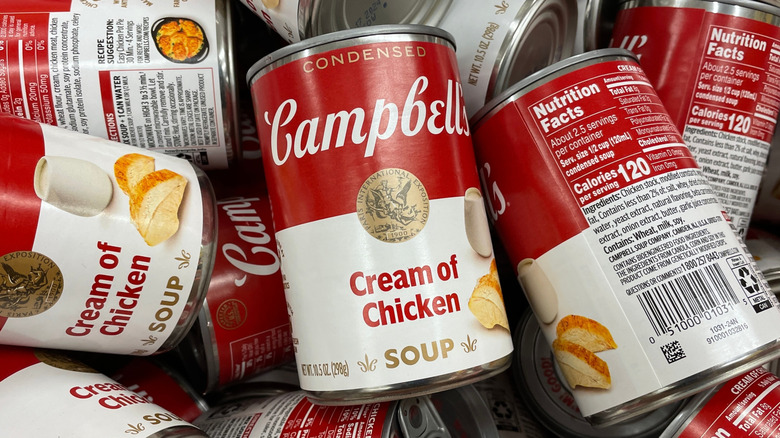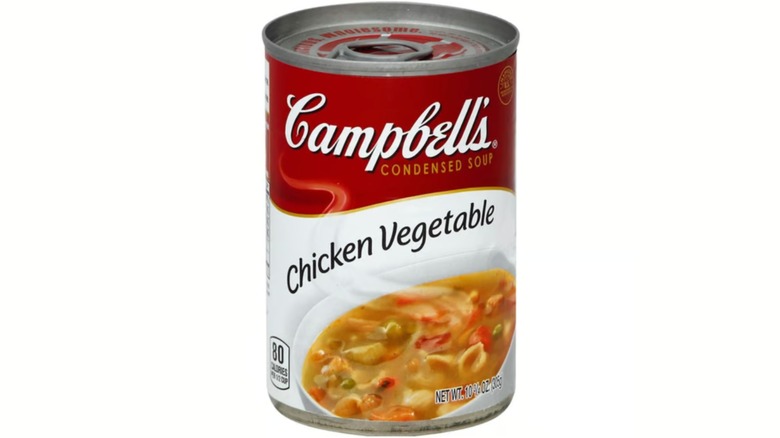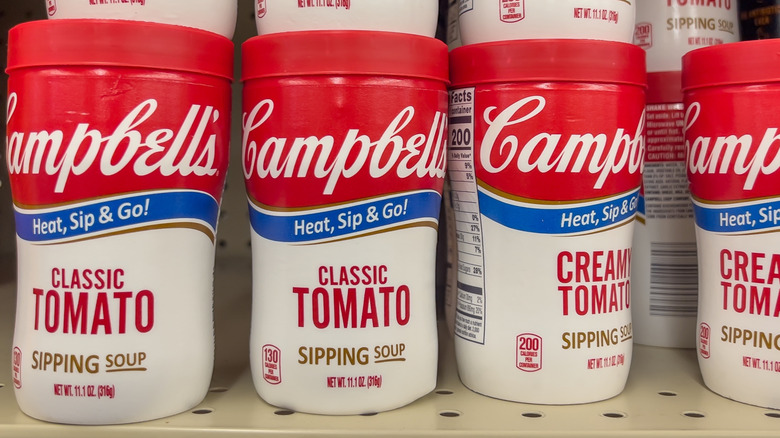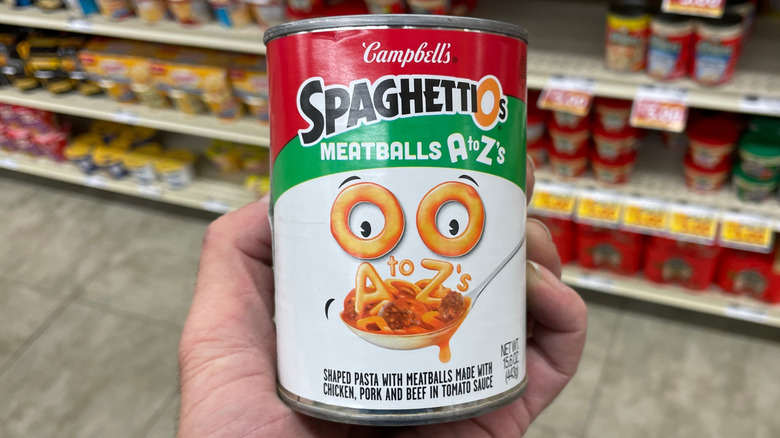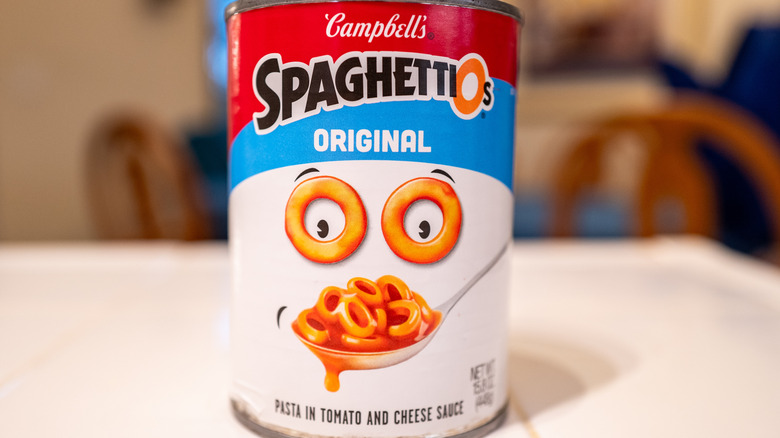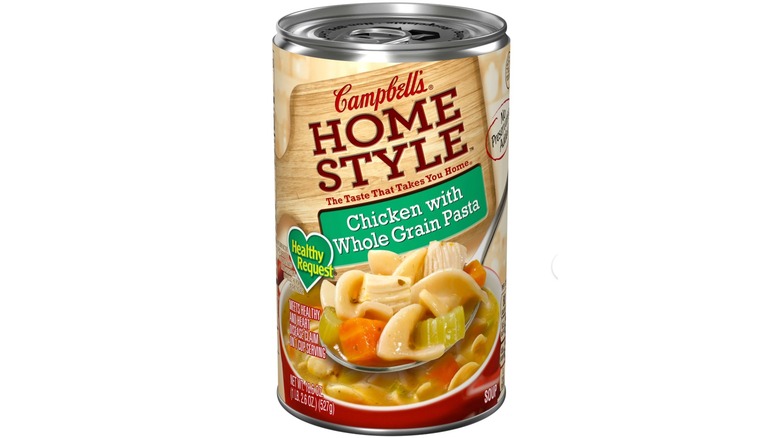The Biggest Recalls In Campbell's History
From tomato soup with grilled cheese for a quick lunch to cream of mushroom for green bean casserole on Thanksgiving, Campbell's soups are ingrained in the lives of many Americans. While Campbell's has many delicious soup flavors, as well as a reputation for producing comforting, dependable products, no brand is immune to mistakes. Like any large food manufacturer, the Campbell Soup Company has faced its fair share of scandals and recalls throughout its over 150-year history.
Over the years, Campbell's has navigated a variety of recall situations — from contaminations to mislabeling incidents, underprocessing issues, and allergen alerts. These recalls have ranged in scale from small batches to millions of pounds of product. No recall of any size is good for a company's image and finances, but the health of the customer is always the top priority. Such incidents underscore the importance of vigilance in food safety. With that in mind, here are some of the biggest recalls in Campbell's history.
Chicken and vegetable botulism contamination (1973)
In 1971, the Campbell Soup Company faced a close call with botulism, a sickness from a deadly toxin that can attack the nervous system. A batch of chicken and vegetable soup cans, produced at a manufacturing plant in Paris, Texas, was initially thought to be contaminated with heat-resistant bacteria. However, subsequent tests revealed that some of the cans actually contained something far worse — a form of botulin, which causes botulism. Before the toxin was even identified, the company kept quiet about the contamination to avoid bad publicity, but once the botulin was confirmed, the USDA initiated the recall and inspection of 230,000 cans.
The contamination, detected through the company's quality control system, affected cans in one day's worth of production that was distributed to 16 states. Thankfully, there were no reported cases of infection, but the recall came on the heels of another botulism incident the prior month. After eating canned vichyssoise produced by Bon Vivant Inc., a couple contracted botulism; the husband passed away and the wife was temporarily paralyzed. For Campbell's, this was the first botulism-related incident in its at-the-time 102-year history.
Tomato Soup allergy alert (2002)
In February 2002, Campbell's announced a voluntary recall of 19,792 cases of its 18.7-ounce cans of Ready to Serve Classic Tomato Soup. After receiving two customer complaints, the company launched an investigation and discovered small amounts of milk and soy proteins in cans that were not labeled to indicate such ingredients. While the classic tomato soup shouldn't contain whey protein concentrate (derived from dairy) and soy protein concentrate, its creamy version should. This means that cans labeled as Classic Tomato Soup actually contained Classic Creamy Tomato Soup.
The product was distributed to 37 states, and with 12 cans per case the total recall came out to roughly 237,504 cans. Upon further investigation, the company discovered that the labeling discrepancy was caused by a malfunction of the plant's label controls. Milk and soy are two major allergens that must be labeled as required by the FDA, so Campbell took immediate action to recall the mislabeled products, and no illnesses were reported.
Underprocessed SpaghettiOs (2010)
SpaghettiOs were first released in 1965, and marketed as "The world's first spoonable spaghetti." Over the years, however, the iconic can full of retro charm has undergone a couple of recalls. One notable incident occurred in June 2010, when the Campbell Soup Company had to recall an astonishing 15,000,000 pounds of three varieties of the soup due to potential underprocessing. The affected products included SpaghettiOs with Meatballs, SpaghettiOs A to Z with Meatballs, and SpaghettiOs Fun Shapes with Meatballs (Cars), all produced in a Paris, Texas manufacturing plant.
Processing issues can refer to a variety of things, including defective packaging, physical contamination, or in this case, partially cooked food. The meatballs did not receive the proper amount of heat during the cooking process, a discovery made during a routine product inspection. Fortunately, Campbell's determined that the affected products had not yet reached consumers. The recall, issued through the USDA's Food Safety and Inspection Service (FSIS), was a precautionary measure to protect public health in case the product had reached any consumers.
SpaghettiOs recalled due to a contaminant (2015)
Another SpaghettiOs recall came on November 12, 2015. Unlike previous recalls involving disease, mislabeling, or underprocessing, this incident was tied to physical contaminants. The Campbell Soup Company recalled 355,000 14.2-ounce cans of Original SpaghettiOs due to pieces of red plastic floating in the soup. The plastic was noticed by customers, roughly 50 of whom filed complaints to the company reporting an unwanted ingredient amongst the circular noodles. After inspection, Campbell confirmed that these pieces of plastic pieces were a part of the can's lining that had peeled off.
Even though only a small number of cans were affected, the danger of ingestion and the potential choking hazard constituted a recall nationwide. The company tried to put customers' minds at ease explaining the plastic, if swallowed, was food-grade and not harmful. But food-grade or not, who wants to eat plastics? In cases like these, customers are encouraged to return the product for a full refund.
Homestyle Chicken with Pasta mislabeling incident (2017)
One of the most recent Campbell's recalls happened in 2017, when a mislabeling incident caught customers off guard. That April, approximately 300 cases of 18.6-ounce cans of Homestyle Healthy Request Chicken with Whole Grain Pasta were shipped to retail locations in Florida. However, the cans were mislabeled and actually contained Homestyle Healthy Request Italian-Style Wedding Spinach & Meatballs in Chicken Broth. Aside from their lengthy names, these two soups had little in common in terms of ingredients, making the mix-up especially notable. After receiving complaints from confused customers about the mismatch, the company initiated a recall of roughly 4,185 pounds of the product.
This recall may have involved fewer products than previous ones, but the labeling error is notable, especially when compared to the classic vs. creamy tomato soup mix-up (at least Campbell's got the tomato soup part right in that case). Even though this mistake may seem minor or even amusing, mislabeling carries serious risks, particularly the potential for undeclared allergens that could lead to sickness or death.
